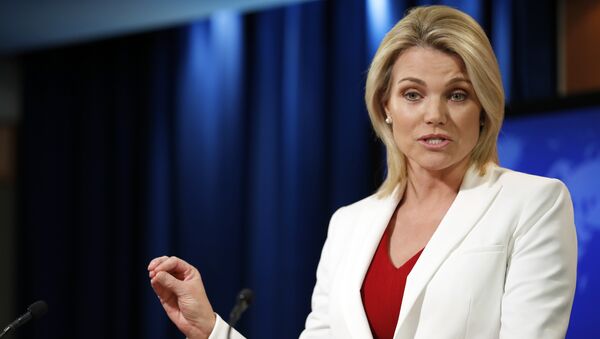Russian journalists from two federal television channels Rossiya 1 and Channel One tried to obtain comments from Nauert with respect to Thursday’s annual address by Russian President Vladimir Putin to the country’s parliament. A correspondent of Rossiya 1 asked Nauert whether the United States is still considering negotiations with Russia on global security issues following Putin’s statements.
"It’s certainly concerning to see your country put together that kind of video that shows the Russian government attacking the United States. That’s certainly a concern of ours. I don’t think that’s very constructive nor is it responsible," Nauert said.
Putin said in his annual address that Russia has developed intercontinental underwater drones and nuclear powered cruise missiles. He also said that the new hypersonic aviation and missile system dubbed Kinzhal (dagger) has been successfully tested and deployed to the south of Russia.
During Putin's speech, a video animation showed the newest SARMAT missile system hitting its target. Several Twitter users were among the first to notice that the land the missile was targeting in the video appeared to be the US state of Florida.
Putin's Federal Assembly Address
— Ian Bugbee (@IBugbee) 1 марта 2018 г.
What we thought we'd get: poverty reduction, infrastructure spending
What we got: Full-on Rocketman video of Florida getting nuked pic.twitter.com/a5x09vZ09K
"You are from Russian TV too, OK, OK," Nauert said. "And I’ve said that, I’ll move on."
Then, a CNN reporter got involved, saying "I am sorry. What does that mean? They are not officials of the Russian government, they are just asking a question about Russia."
"Oh, really?" Nauert said. "Well, we know that RT and other Russian so-called news organizations are funded and directed by the Russian government. So, if I don’t have a lot of tolerance…"
Matthew Lee of the Associated Press then asked Nauert the question posed by Russia’s Channel One reporter.
"Is that the assessment of the US government that it had the missiles in the video ended up at their presumed target and that target was the United States," Lee asked.
The Russian media outlets, particularly, RT and Sputnik, have recently faced pressure by the US authorities over their alleged involvement in the 2016 US presidential election.
Particularly, in November, the US branch of the RT broadcaster registered as a "foreign agent" in the United States under the Foreign Agents Registration Act (FARA) upon the request of the Department of Justice.
Other foreign state media operating in the United States, such as the United Kingdom’s BBC, Germany’s Deutsche Welle and others, have not been asked to register. RT and Sputnik s editor in chief Margarita Simonyan has denied the claims of meddling in the 2016 US election.
The Kremlin has also refuted the allegations of meddling with Russian presidential spokesman Dmitry Peskov calling such claims groundless.




